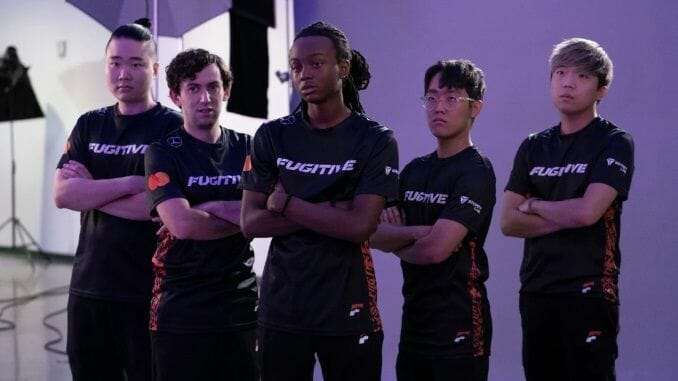New Mockumentary Players Is The Last Dance of Esports
Photos by Lana Solanki, courtesy of Paramount
Like their previous show, American Vandal, Tony Yacenda and Dan Perrault’s new mockumentary Players casts a satirical eye on the documentary industry. Instead of applying true crime techniques and tropes to fictionalized high school vandalism, though, Players turns toward esports to mock the style of The Last Dance, the ESPN-produced docuseries about Michael Jordan and the Chicago Bulls basketball team. Players was also produced in conjunction with Riot Games, the deeply troubled developer and publisher of the world’s most popular PC esport, League of Legends. In turn, Players has the dual objectives of promoting League of Legends while satirizing the sports docuseries style. Because of its form, it feels a lot more like a real documentary than the Office successors of the world, like the brilliant Abbott Elementary. That also means it has the selective aim of a real docuseries, leaving some interesting subject matter hanging in the background, with unresolved storylines and under-explored characters and relationships.
Players follows fictional esports organization Fugitive Gaming through a full season of the North American League Championship Series, focusing each episode on a certain character and event while hopping back in time to show their path to that point of the season, the same sort of incongruent chronology utilized by The Last Dance. The series focuses on the relationships between Creamcheese (Misha Brooks)—a renowned League player with a reputation among other players and fans as “annoying” who never won a North American championship—and his current and former teammates, especially Organizm (Da’Jour Jones), an up-and-coming star from Philadelphia.
Players succeeds at humor that is both smart and crass, but also skirts some issues that would have been interesting to explore. For instance, Organizm’s family not understanding esports until his success makes a lot of sense. The interactions with his family feel like an authentic depiction of a kid from Philly becoming an esports star, though a real sports documentary would likely fixate on his Blackness, for genuine or cynical reasons, as he enters into a sport and roster of non-Black players. It might be unfair to say Players fails at addressing race when it allows that to feel like the background rather than the fore. However, considering the real-life harassment that some streamers face just for being minorities, it could have been naturally addressed. But that’s the sort of thing Riot would probably want to avoid shining a light on. Here, toxicity in online gaming boils down to the abrasive, obsessive, and conceited.
Players isn’t afraid to give most characters the rough edges of real humans rather than making them perfect representations of idealized protagonists. Offering these characters not as caricatures or archetypes, but as flawed individuals without editorial commentary, is how and where the mockumentary comes across as most accurately satirizing and channeling The Last Dance. The athletes are given enough rope to hang themselves. And, unlike in that show, there’s no dead general manager to uncritically blame for breaking apart a team he built. Rather, we have the antagonisms of one central, infamously annoying star player interacting with the young hot shot he’s afraid to lose his shine to, as well as his historic antagonisms with former teammates that figure largely in the fictionalized esports and League of Legends online communities.